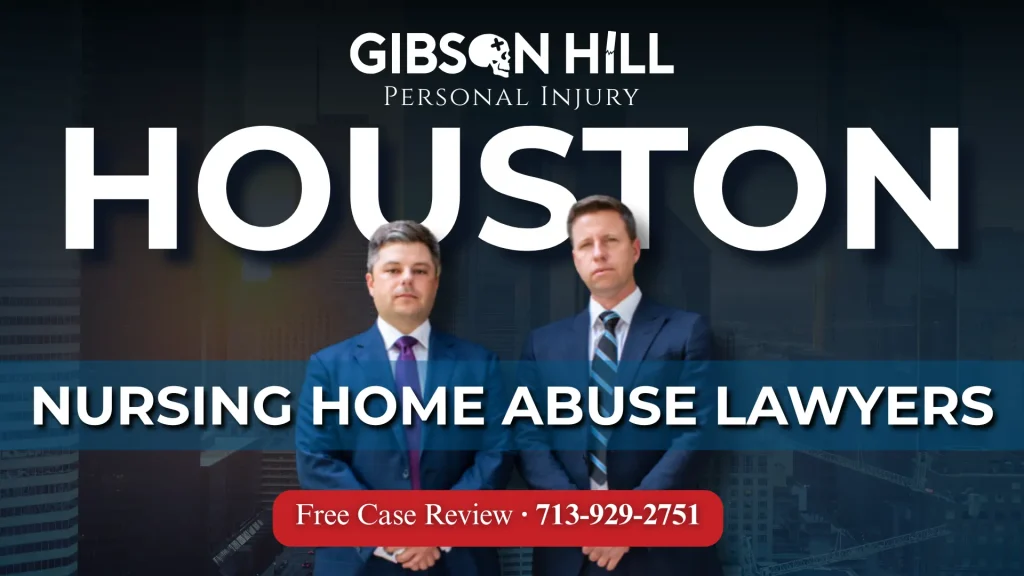
When families trust a care facility to care for their elderly loved ones, they expect compassion, respect, safety, and professionalism. Unfortunately, elder abuse and neglect are still real concerns in many long-term care facilities. Texas nursing homes have a documented history of issues with quality and safety, with the prevalence of abuse and neglect being a serious problem in the state. If you believe your loved one may be suffering, a compassionate and experienced Houston nursing home abuse attorney can help you take action and protect their well-being.
At Gibson Hill Personal Injury, we help families seek justice for their loved ones dealing with nursing home abuse or neglect. Texas authorities play an integral role in monitoring nursing home facilities and responding to complaints about abuse, neglect, and violations. It’s upsetting to know your loved one has suffered when you trusted a facility to keep them safe and healthy. Legal action can help ensure negligent facilities are held accountable. Call (713) 659-4000 or contact us online today and get started with a free consultation with a Houston personal injury lawyer.
Elder Abuse Signs
It is important for caregivers and family members to notice signs of abuse and neglect in nursing homes to ensure timely intervention and protection of residents. Some key physical signs of nursing home neglect include:
Unexplained Injuries
Unexplained bruises or injuries, which may be a warning sign of mistreatment or inadequate care. Bruises, cuts, or broken bones without a known cause may suggest physical abuse or neglect by staff.
Sudden Social Isolation
A normally social resident who becomes withdrawn may be experiencing emotional abuse or neglect by staff members. Refusing to join group activities can signal intentional isolation, and abusers may isolate victims to prevent detection.
Rapid Weight Loss
Unexplained and rapid weight loss may stem from malnutrition, dehydration, or medical neglect. It may also indicate emotional distress or untreated depression in response to potential caregiver abuse. Nursing homes must monitor resident nutrition and respond quickly to significant weight changes.
Untreated Infections
Ignored or untreated infections often signal severe neglect in nursing homes. Common diseases that could signal neglect or abuse include UTIs, bed sores (also known as pressure ulcers), and respiratory illnesses. Bed sores are injuries caused by prolonged pressure on the skin, often in bedridden individuals, but they are preventable if residents are properly cared for through regular repositioning and good hygiene. Prompt medical care is essential for elderly residents, and worsening or ongoing infections may show repeated care failures.
Unusual Financial Activity
Large withdrawals, missing items, or strange charges may indicate financial exploitation, a form of abuse that targets an individual’s finances. Cognitively impaired residents are especially at risk for financial exploitation.
Fearful Behavior
A loved one who seems anxious, nervous, or scared around certain staff may be experiencing abuse. Fearful behavior may also be a response to psychological abuse, such as emotional neglect, verbal assaults, or intimidation. Fearful reactions can signal physical, emotional, or verbal mistreatment. Take these signs seriously and investigate them right away.
Poor Hygiene
Neglect of personal hygiene is a warning sign in nursing homes. Dirty clothing, body odor, unwashed hair, or soiled bedding show signs of neglect. Facilities must help residents with hygiene daily, and consistently poor hygiene increases infection and disease risks, lowering the quality of life.
Caregiver Red Flags
Abuse often starts with warning signs in the caregiver’s attitude or behavior. A caregiver who controls conversations about the resident or acts aggressively, dismissively, or possessively may be concealing neglect or abuse. Watch for caregivers who discourage private visits or seem overly involved in limiting the resident’s contact with others.
How to Help as a Family Member
There are several elder abuse prevention strategies family members can use to look out for their elderly relatives. These include:
- Build Relationships with Staff – Get to know the staff and communicate regularly to build trust and ensure your loved one receives attentive care.
- Visit Regularly – Unannounced visits help you observe care quality and show staff that someone is actively monitoring your loved one’s well-being.
- Know the Signs of Abuse and Neglect – Watch for warning signs like bruises, poor hygiene, sudden mood changes, or weight loss, which may indicate abuse or neglect.
- Stay Involved – Attend care meetings, ask questions, and advocate for your loved one to make sure their needs and rights are respected.
- Monitor Records – Review medical and financial records closely to spot unusual charges, missed treatments, or signs of exploitation.
- Report If You Suspect Nursing Home Abuse Immediately – Act quickly by reporting concerns to facility management and state authorities to protect your loved one and others.
- Call a Houston Nursing Home Abuse Lawyer for Legal Assistance – Contact a qualified nursing home abuse lawyer in Houston to investigate, protect your loved one’s rights, and pursue compensation if needed.
Other family members should also stay involved and vigilant, as their advocacy and attention can help protect vulnerable loved ones and ensure accountability.
Nursing Home Abuse Lawsuit Process
Knowing the steps involved in a personal injury lawsuit for nursing home negligence can relieve worry or anxiety about pursuing a lawsuit. Key steps in the legal process include:
- Recognize the Signs of Neglect or Abuse – Watch for warning signs like bruises, weight loss, poor hygiene, emotional withdrawal, or sudden behavioral changes.
- Report the Abuse – Notify nursing home management and report concerns to Texas Health and Human Services or local law enforcement if needed.
- Contact a Nursing Home Abuse Lawyer – An experienced nursing home abuse attorney in Houston can help protect your loved one’s rights, assess your case, and explain the legal options.
- Investigate and Collect Evidence – Your lawyer will gather records, witness statements, and expert opinions to build a strong case against the facility or staff.
- File the Lawsuit – Once your attorney collects enough evidence, they’ll file a legal complaint outlining the abuse and the losses sought.
- Negotiate a Settlement – Many cases settle as your attorney can negotiate for fair compensation to cover your losses, potentially without going to court.
- Go to Trial – If a settlement isn’t possible, your case may go to trial, where a judge or jury will determine the outcome.
A law firm can guide families through the legal process of pursuing justice and damages for nursing home negligence.
Legal Rights of Nursing Home Residents
Nursing home residents do not lose or forfeit rights when relocating into a nursing home or assisted living facility. Some nursing home resident rights include:
- Involvement in Care Decisions – Residents have the right to know about their medical condition and participate in care plans and treatment decisions.
- Freedom from Neglect and Abuse – Nursing home residents must have protection against all forms of physical, emotional, sexual, and financial abuse or neglect.
- Safe and Clean Environment and Adequate Care – Facilities must provide a sanitary, safe, and secure environment and ensure residents receive adequate care that supports their health and well-being.
- Dignity and Respect – Every resident deserves compassion, respect, and consideration, regardless of their physical or mental condition.
- Privacy and Confidentiality – Residents have the right to personal privacy regarding care, communication, and in the handling of their medical and financial information.
- Right to Complain and Report Abuse – Residents can voice concerns or report abuse without fear of retaliation, and facilities must respond promptly and appropriately.
Nursing home administrators are responsible for ensuring these rights are protected and that facilities comply with all regulations.
These rights and protections are established and enforced under Texas law, including statutes such as the Texas Health and Safety Code and the Nursing Home Reform Act of 1987.
Elder Neglect Legal Remedies
Abused individuals and their family members have a few legal avenues to rectify the harm their loved one endured. These options include:
- Criminal Charges – The responsible individuals may face criminal prosecution in severe neglect or abuse cases. Possible criminal charges can potentially lead to fines or imprisonment for perpetrators.
- Civil Claims and Lawsuits – Families and victims can file a civil lawsuit against the staff or facility to seek compensation for their losses and to hold the facility accountable for the abuse or neglect. Legal action ensures that both individual abusers and the facility are held accountable.
- Regulatory Complaints – Families can file complaints with a state agency, like Texas Health and Human Services. These investigations may result in sanctions, fines, or license revocation for the facility.
In cases where abuse or neglect results in a loved one’s death, families may also pursue wrongful death claims to seek justice and compensation.
Elder Abuse Support Resources
Houston has numerous local and state resources available to those experiencing elder abuse, including:
- Adult Protective Services – Adult Protective Services (APS) investigates reports of exploitation, neglect, or abuse of elderly or disabled adults. Anyone can report suspected abuse to APS in Texas or other appropriate authorities to ensure intervention and protection.
- Long-Term Care Ombudsman – The Long-Term Care Ombudsman advocates for assisted living facilities and nursing home residents. They audit complaints, inform families of residents’ rights, and aim to resolve resident care and quality of life issues.
- Houston Police Department – The family violence unit of HPD can investigate suspected criminal elder abuse and refer cases to appropriate social services.
- Harris County Resources for Children and Adults – This Harris County agency provides services for at-risk individuals, including elderly individuals, experiencing neglect or abuse. They can coordinate with law enforcement, APS, and other community programs to offer protection to abused elderly individuals.
Frequently Asked Questions
Most of our nursing home abuse clients have never dealt with an issue like this before. We’ve answered some of the questions they initially asked for you here.
Do I need an attorney to file a complaint or lawsuit?
Reporting elder abuse to a regulatory agency doesn’t require a lawyer, but an attorney is critical if you’re filing a lawsuit. They can collect evidence, handle insurers, and fight for the maximum compensation your loved one deserves. Without legal guidance, it’s easy to miss deadlines or overlook crucial details that could negatively impact your case.
How long do I have to file a nursing home abuse lawsuit in Texas?
You have two years from the date the neglect or abuse occurred or was revealed to file a lawsuit in Texas. Waiting too long to file could prevent you from being able to pursue compensation.
Can I move my loved one to another facility during an investigation?
You can relocate your family member immediately if you believe your loved one is unsafe in their facility. Residents have the right to leave the facility, especially regarding safety and care concerns. Nursing homes cannot retaliate against a resident for moving out or filing a complaint.
What compensation is available in a nursing home abuse case?
You can seek compensation for various losses in elder abuse compensation claims, including money for medical expenses, pain and suffering, and relocation costs. A nursing home abuse attorney can evaluate your case to determine how much compensation to pursue.
Contact a Houston Nursing Home Abuse Attorney Today
If you suspect your loved one has suffered abuse or suspect potential abuse in a nursing home. This includes cases involving sexual abuse, elderly abuse, emotional harm, inadequate supervision, or harm caused by other residents. Consequently, our board certified nursing home abuse lawyers are ready to help.
Protect your loved one today by calling Gibson Hill Personal Injury to talk to our team of experienced Houston nursing home abuse attorneys. Our law firm will listen to your concerns, investigate the abuse, and fight for the compensation and justice your family needs. Contact us online or today at (713) 659-4000 for your free consultation.





